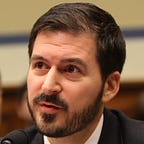Facebook’s Failure to End ‘Public by Default’
With one simple change, Facebook could pass an important privacy test
Co-authored by Woodrow Hartzog and Evan Selinger
Turns out, you can’t create an idyllic global village by fetishizing connecting people. In the most recent chapter of the book on why Silicon Valley still doesn’t get it, the New York Times recently reported that Facebook “removed 66 accounts, pages and apps linked to Russian firms that build facial recognition software for the Russian government.”
It’s unnerving, to say the least, that prime suspects SocialDataHub and Fubitech might have scraped enough user profiles to create “a mirror of the Russian portion of Facebook” so Putin could repurpose the information and weaponize it for authoritarian surveillance. From fake news to state-sponsored tyranny, we’re living through a moment where all kinds of bad actors have their eyes set on Facebook’s treasure trove of personal data. Even assuming the platform was ever reserved for our “friends,” it isn’t anymore.
Right now, users have little choice in the public exposure of their profile pictures. Every single one of them is set to “public” by default.
